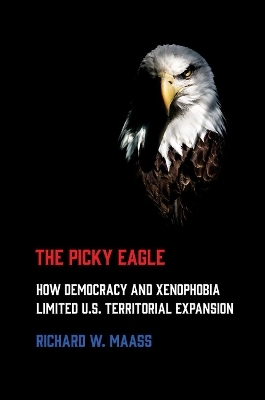
The Picky Eagle
How Democracy and Xenophobia Limited U.S. Territorial Expansion
Seiten
2023
Cornell University Press (Verlag)
978-1-5017-7229-0 (ISBN)
Cornell University Press (Verlag)
978-1-5017-7229-0 (ISBN)
The Picky Eagle explains why the United States stopped annexing territory by focusing on annexation's domestic consequences, both political and normative. It describes how the US rejection of further annexations, despite its rising power, set the stage for twentieth-century efforts to outlaw conquest. In contrast to conventional accounts of a nineteenth-century shift from territorial expansion to commercial expansion, Richard W. Maass argues that US ambitions were selective from the start.
By presenting twenty-three case studies, Maass examines the decision-making of US leaders facing opportunities to pursue annexation between 1775 and 1898. US presidents, secretaries, and congressmen consistently worried about how absorbing new territories would affect their domestic political influence and their goals for their country. These leaders were particularly sensitive to annexation's domestic costs where xenophobia interacted with their commitment to democracy: rather than grant political representation to a large alien population or subject it to a long-term imperial regime, they regularly avoided both of these perceived bad options by rejecting annexation. As a result, US leaders often declined even profitable opportunities for territorial expansion, and they renounced the practice entirely once no desirable targets remained.
In addition to offering an updated history of the foundations of US territorial expansion, The Picky Eagle adds important nuance to previous theories of great-power expansion, with implications for our understanding of US foreign policy and international relations.
By presenting twenty-three case studies, Maass examines the decision-making of US leaders facing opportunities to pursue annexation between 1775 and 1898. US presidents, secretaries, and congressmen consistently worried about how absorbing new territories would affect their domestic political influence and their goals for their country. These leaders were particularly sensitive to annexation's domestic costs where xenophobia interacted with their commitment to democracy: rather than grant political representation to a large alien population or subject it to a long-term imperial regime, they regularly avoided both of these perceived bad options by rejecting annexation. As a result, US leaders often declined even profitable opportunities for territorial expansion, and they renounced the practice entirely once no desirable targets remained.
In addition to offering an updated history of the foundations of US territorial expansion, The Picky Eagle adds important nuance to previous theories of great-power expansion, with implications for our understanding of US foreign policy and international relations.
Richard W. Maass is Associate Professor of Political Science in the Department of Political Science and Geography at Old Dominion University. Follow him on X @richardmaass.
1. The Limits of U.S. Territorial Expansion
2. Explaining Annexation
3. To the Continent: European Empires and U.S. Annexation
4. To the West: Native American Lands and U.S. Annexation
5. To the North: Canada and U.S. Annexation
6. To the South: Mexico and U.S. Annexation
7. To the Seas: Islands and U.S. Annexation
8. The International Implications of U.S. Annexation
| Erscheinungsdatum | 26.08.2023 |
|---|---|
| Zusatzinfo | 1 Maps; 2 Charts |
| Verlagsort | Ithaca |
| Sprache | englisch |
| Maße | 152 x 229 mm |
| Gewicht | 907 g |
| Themenwelt | Geisteswissenschaften ► Geschichte ► Regional- / Ländergeschichte |
| Geschichte ► Teilgebiete der Geschichte ► Wirtschaftsgeschichte | |
| Sozialwissenschaften ► Politik / Verwaltung | |
| ISBN-10 | 1-5017-7229-5 / 1501772295 |
| ISBN-13 | 978-1-5017-7229-0 / 9781501772290 |
| Zustand | Neuware |
| Informationen gemäß Produktsicherheitsverordnung (GPSR) | |
| Haben Sie eine Frage zum Produkt? |
Mehr entdecken
aus dem Bereich
aus dem Bereich
Macht und Herrschaft im Zarenreich
Buch | Hardcover (2024)
C.H.Beck (Verlag)
CHF 69,85
wie die USA und China um die technologische Vorherrschaft auf der …
Buch | Hardcover (2023)
Rowohlt (Verlag)
CHF 41,95


